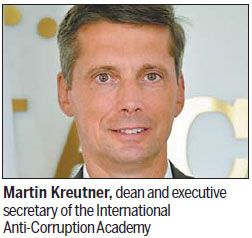Anti-graft agency backs corruption fight
China's anti-corruption campaign is leaving an impression nearly 7,000 kilometers away.
Martin Kreutner, dean and executive secretary of the International Anti-Corruption Academy, an organization based in Austria, says the Chinese central government's fight against graft "is important so that people see that it's also the big fish that are ultimately held accountable to the rule of law and the legal framework".
"From an outsider's perspective, China goes not only for the flies but also the tigers," says Kreutner, referring to low and high-level officials.
China's anti-corruption campaign, launched in late 2012 after President Xi Jinping came into power, has produced shock waves throughout the country's political and economic systems.
According to the Communist Party of China's Central Commission for Discipline Inspection, it is working with the country's top court, top procuratorate, the central bank and the nation's ministries of foreign affairs, public security, state security and justice on an international manhunt for suspected corrupt officials.
Since November, the Austrian federal police and Chinese authorities have worked together to find Chinese fugitives who have fled their home country.
The International Anti-Corruption Academy was set up in 2011 by the United Nations Office on Drugs and Crime, the European Commission's Anti-Fraud Office and the Austrian government. "Any cooperation between countries, including between Chinese authorities and the Austrian federal police, has a promising potential to foster the global fight against corruption".

According to the CCDI, it is pursuing Chinese fugitives by asking countries for extradition assistance, the repatriation of illegal immigrants and asking suspects to voluntarily turn themselves in.
It is also using bilateral, extradition treaties with 39 countries and criminal judicial assistance treaties with 52 countries to nab Chinese fugitives.
"Modern and comprehensive anti-corruption strategies are based upon a four-pronged approach: prevention, education, law enforcement and international cooperation, including asset recovery," Kreutner says.
China is also making efforts to promote anti-corruption cooperation under multilateral agreements.
The commission says that more than 500 Chinese officials who have fled abroad were detained last year and more than 3 billion yuan ($485 million) in illegal gains were confiscated.
Last year, China joined IACA, which acts as both an intergovernmental organization and educational institution. The agency includes 63 parties and 53 signatories from around the world.
"Our global constituency empowers professionals and helps stakeholders strengthen their anti-corruption regimes. Throughout our activities, we draw on the richness and fabric of our constituency and the diversities embodied in it," Kreutner says.
The academy has trained authorities from more than 120 countries to tackle corruption.
"We have had a number of Chinese participants in our programs and training over the years. What is more, for some of the programs, lecturers from China were also invited to present their experience and expertise."
"If all the provisions of the UN Convention Against Corruption are properly implemented, this country would definitely be better off regarding its anti-corruption campaign."


















